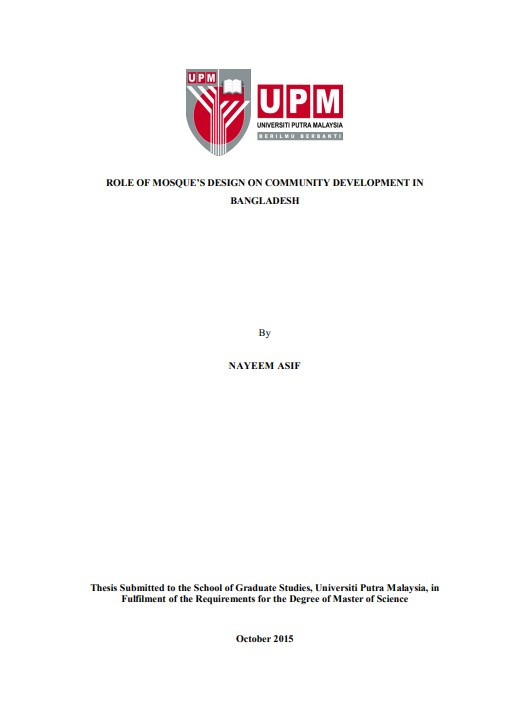
The institution of mosque acted as the center of activity of Muslim communities for centuries. During the early days of Islam, administrative, educational, social, financial, and judicial activities were conducted centering the mosque. Up until now, mosque is one of the major establishment within a Muslim community in countries with Muslim majority as well as countries where Muslims are minority. But mosques of today are not as active and involved with society as they were during early age of Islam. This study aims to identify the factors behind the inactiveness of mosque institutions within Muslim communities nowadays and proposes recommendations to improve the situation. It is almost inevitable that every Muslim community would have at least one mosque within the locality. For most of the cases in Muslim major countries, there are more than one mosque to be found in any locality. These institutions are mostly use for prayer, meditation and recitation purposes. But there are so many potentials to utilize these existing infrastructures as center for community development by extending the scope of activities with the participation of the community people. According to the teaching of Islam people in a community meets in these mosques five times a day and the interactions strengthen the social bond which is a precondition for creating a harmonious society. Extending the activities of mosque with the participation of these people would ensure a balanced development of the community. This study compiled and analyzed the opinions of previous researches regarding this issue and formulated a template for evaluating the activeness of mosque institution. By virtue of the authors residing country and working experience, the study focuses specifically on mosques in Bangladesh. Qualitative interview of experts and professionals were conducted to evaluate the current scenario regarding this topic and compile recommendations proposed by them. Finally, three mosques in Bangladesh were chosen and evaluated according to the pre-defined template. Recommendations for improving the situation were presented consequently. By analyzing the results, this study concluded that several factors are responsible for the inactiveness of the mosques in Muslim communities. Inefficient management, absence of income generating schemes, exclusion of certain social groups and inadequate facilities are the major factors identified by this study. There are some minor factors which were also identified and recommendations were made based on all these factors at the end of the research. Mosque is not a temporary institution of any Muslim settlement rather, it can be said that, as long as there will be Muslim communities the institution of mosque will be found functioning within it. So it is highly recommended that these institutions are utilized to the fullest extent for the development of their surrounding communities. This study identified the factors behind the inactiveness of contemporary mosques and proposed resolution to integrate the mosques with the lives of Muslims in every possible way.
I agree to the terms outlined below:
You agree to upload and assign Mosqpedia Database the rights to use the content worldwide and in perpetuity across all current and future media platforms. Mosqpedia Database may edit, copy, adapt and translate your contribution.
The content will be distributed under the Creative Commons Attribution-Deed – Attribution-NonCommercial-NoDerivatives 4.0 International – Creative Commons
All data will be stored in line with data protection regulations.